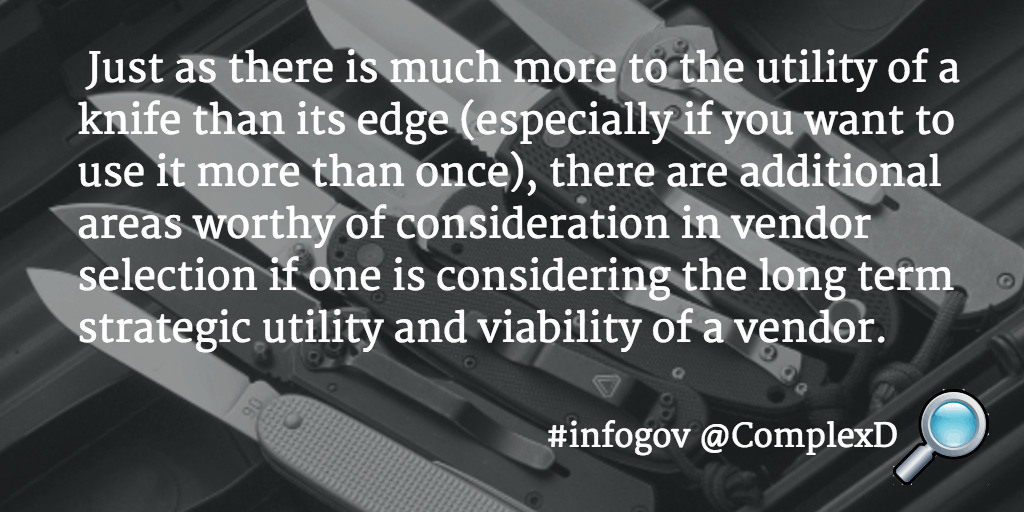ARCHIVED CONTENT
You are viewing ARCHIVED CONTENT released online between 1 April 2010 and 24 August 2018 or content that has been selectively archived and is no longer active. Content in this archive is NOT UPDATED, and links may not function.
Beyond the Technology: Considering Information Governance Vendor Viability
Definition: Viable – capable of success or continuing effectiveness. (The Free Dictionary)
One of the areas that has the potential to impact the risk of any information governance project is an organization’s selection of the technology and talent that will be task organized to support the technical and business objectives of the initiative. There are many vendors with many technologies and many ways in which they deliver their people, processes and products to clients. In considering vendors for these important initiatives, much is often shared about the specific capability and cost of technology and people provided to solve client challenges. This sharing on specific capability and pricing is usually presented in a manner that:
- Speaks to the capability of a vendor’s technology and people to perform specific tasks as needed by the client.
- Specifies the pricing for the delivery of the technology and talent to support the client’s stated need.
This focus on the technology and talent elements of an information governance vendor’s capability is certainly warranted as these elements ultimately provide the cutting edge for the knife of task execution. However, just as there is much more to the utility of a knife than its edge (especially if you want to use it more than once), there are additional areas worthy of consideration in vendor selection if one is considering the long term strategic utility and viability of a vendor.
Beyond Technology and Talent: Strategically Comparing Vendors
In an effort to help information governance decision makers consider and compare both the immediate and long term success potential of vendors, the following considerations are provided for your review. The author is well aware that there are many considerations required to truly evaluate information governance vendors and the following considerations represent one view of how one can consider/compare vendors beyond just the “feature and function and pricing” of services and products.
9 Subjective Considerations for Assessing Information Governance Vendors
1. Technology = Demonstrated ability of product/service offering’s technical contribution to solving specific information governance challenges.
Does the vendor’s technology appear to do what you need it to do? Can the technology be validated by some entity other than the vendor?
2. Domain Knowledge = Demonstrated ability of an organization to utilize technology to solve specific information governance challenges.
Does the vendor understand the domain you are operating in or do they just understand their technology?
3. Awareness = An organization’s mindshare in the eyes of the client in relation to other organizations seeking to solve similar information governance challenges.
Is the vendor known by information governance analysts, thought leaders, influencers, and information governance experts?
4. Reputation = The confidence level customers have in the actual or perceived ability of an organization to solve information governance challenges viewed in relation to other organizations.
Does the vendor have a reputation for being able to deliver on the expectations they set in a timely and accurate manner?
5. Free Cash Flow = Net Income + Depreciation/Amortization – Changes In Working Capital – Capital Expenditure.
Is the vendor able to meet financial commitments to support client needs and internal/external commitments?
6. Clients = The number of active entities that have paid for information governance products/services in the current calendar year.
Does the vendor have clients who have moved beyond the partner, master services agreement, and/or pilot phase of an engagement and are actually using the product/service in a production environment on a regular basis?
7. Motive = The stimulus causing an organization to determine product/service strategies and tactics.
Are vendor decisions made for the greater good of clients and vendor support staff or are they personality driven completely based on the personal objectives of the vendor ownership?
8. Sincerity = Congruence or lack thereof between an organization’s stated market desires and actual leadership actions.
Does the vendor do what they say they are going to do for both clients (external sincerity) and internal support staff (internal sincerity)?
9. Employee Turnover = The rate at which an organization gains or loses staff.
Is the vendor committed to its employees/contractors? Are vendor employees/contractors committed to the vendor?
While non all-inclusive, these nine subjective considerations can help information governance decision makers consider vendors when making critical sourcing decisions that may have an impact on their organization for many years to come. There are many checklists for the objective elements needed for successful delivery of information governance support from vendors, but this subjective consideration list may help decision makers decrease their risk of making a wrong vendor decision.























